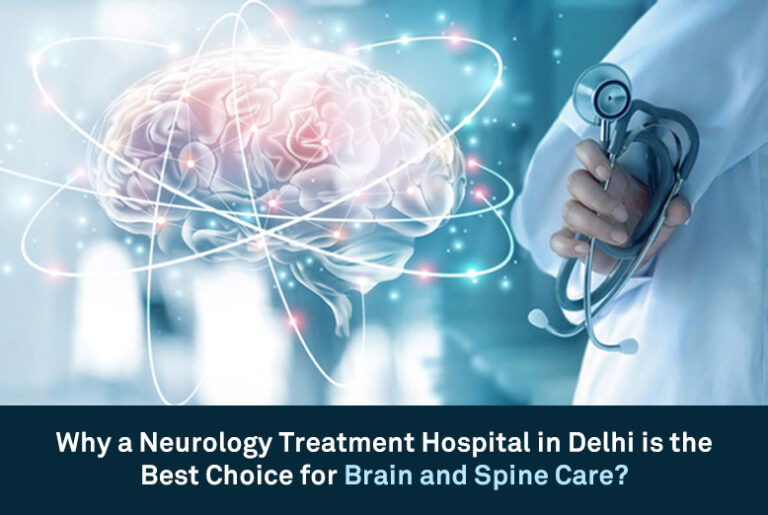Brain and spine disorders can significantly affect daily life, impacting movement, coordination, memory, and overall well-being. Conditions such as stroke, epilepsy, Parkinson’s disease, spinal injuries, and tumours can disrupt normal functioning and quality of life. Patients often face challenges such as delays in diagnosis, difficulty accessing specialists, and fragmented care for complex neurological and spinal conditions, which can lead to slower recovery and suboptimal outcomes.
Delhi is known for its advanced neurology services, offering patients access to a wide range of hospitals with modern diagnostic equipment, skilled neurologists and neurosurgeons, and multidisciplinary teams. These institutions provide integrated care, from medical management to advanced surgical procedures, ensuring timely and effective treatment. This combination of expertise, technology, and specialist services makes Delhi a strong choice for patients seeking comprehensive brain and spine care.
Key Reasons to Choose a Neurology Treatment Hospital in Delhi:
- Access to Experienced Specialists: Hospitals in Delhi have teams of highly skilled neurologists, neurosurgeons, and neurophysiologists with extensive experience in treating complex brain and spine disorders. Patients benefit from the collective expertise of specialists who work together to create precise and individualised care plans.
- Comprehensive Diagnostic Facilities: Advanced diagnostic tools, including 3 Tesla MRI, 256-slice CT scanners, EEG, EMG, and neck and head Doppler ultrasound, enable accurate evaluation of neurological conditions. These facilities help detect disorders early and support timely treatment planning.
- Multidisciplinary Approach: Effective neurological care requires collaboration among multiple specialties, including neurology, neurosurgery, rehabilitation, radiology, and physiotherapy. Coordinated care ensures that every aspect of a patient’s condition—medical, surgical, and functional—is addressed comprehensively.
- Integrated Treatment Options: From conservative medical management to minimally invasive procedures and advanced treatments, hospitals in Delhi offer a full spectrum of care. Patients benefit from treatments such as thrombolysis for stroke, surgical interventions for spinal disorders, and referral pathways for advanced therapies like deep brain stimulation (DBS) at specialised centres when required.
- Rehabilitation and Support Services: Rehabilitation is crucial for recovery from neurological and spinal disorders. Hospitals in Delhi offer physiotherapy, occupational therapy, and speech therapy programmes designed to restore strength, balance, coordination, and communication skills. Patients also receive counselling and lifestyle guidance to manage long-term challenges.
- Patient-Centred Care: Leading neurology hospitals emphasize compassion and patient involvement. Patients and families are actively included in treatment planning, ensuring that care aligns with personal goals and comfort. Educational support helps families understand conditions and navigate the recovery process.
- Advanced Technology and Treatment Techniques: Delhi hospitals integrate modern neurosurgical techniques, stereotactic radiosurgery, endovascular procedures, and comprehensive stroke management to improve precision, reduce recovery time, and enhance outcomes. Minimally invasive procedures help reduce discomfort and support faster rehabilitation.
- Specialised Brain and Spine Care: Medical institutions like Venkateshwar Hospital are known for their NABH-accredited multi-specialty setup, advanced diagnostic technology, dedicated neurology and neurosurgery teams, and integrated care approach, ensuring patients receive precise evaluation, timely treatment, and supportive rehabilitation under one roof.
- Accessibility and Convenience: Delhi’s hospitals are strategically located with good connectivity, making it easier for patients from the city and surrounding regions to access specialised neurological care. Many hospitals also offer support services such as patient guidance, appointment assistance, and referral networks for continued care.
- Comprehensive Care Across Age Groups: Hospitals in Delhi cater to a wide age range, from young adults recovering from neurological injuries to elderly patients managing conditions like dementia, Parkinson’s, and age-related spinal disorders. Tailored programmes and specialised geriatric neurocare enhance outcomes and quality of life.
- Focus on Early Intervention: Early diagnosis and intervention are critical for preventing the progression of neurological conditions. Delhi hospitals prioritise prompt evaluation and treatment, which can significantly reduce complications and improve long-term recovery prospects.
- Patient Safety and Standards: Many hospitals maintain high standards of clinical governance, hygiene, and patient safety. NABH accreditation and adherence to international protocols ensure that patients receive reliable, evidence-based care.
Choosing the right neurology treatment hospital can make a significant difference in the management of brain and spine conditions. Hospitals in Delhi offer a unique combination of expert specialists, advanced diagnostic technology, multidisciplinary collaboration, and comprehensive rehabilitation services, ensuring patients receive timely and effective care.
With their focus on early intervention, patient-centred approaches, and integrated treatment plans, these hospitals not only address medical needs but also provide the support and guidance required for long-term recovery. For patients seeking reliable, high-quality care for neurological and spinal disorders, Delhi remains a preferred destination, offering access to world-class facilities and the expertise needed to improve health outcomes and quality of life.
Also Read: What You Should Know About A Hospital Indemnity Policy?



